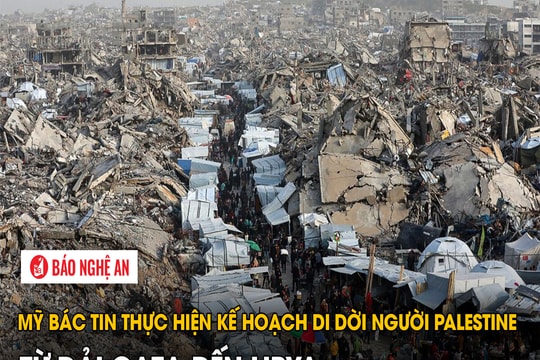Is Russia the main 'player' in Libya?
(Baonghean.vn) - The Libya Peace Conference in Berlin on January 19 was a complete failure because a group of countries that had once devastated and blatantly violated Libya's sovereignty now called for anti-intervention and protection of Libya's sovereignty, which is truly humorous. Therefore, in the end, as Turkish President Erdogan said: "Only Russia can resolve the remaining Libyan situation."
From a developed country with high economic growth and human development indexes, but just because it wanted to build an independent project for the African Union by creating a currency to replace the CFA Franc imposed by France on 14 former African colonies, France (the mastermind) along with the US - NATO attacked and destroyed Libya, killing Libyan President Gaddafi.
Sovereign wealth funds, some $150 billion invested abroad by the Libyan Gaddafi government, were “frozen” on the eve of war and most of it has disappeared. Of the 16 billion euros blocked at Euroclear Bank, 10 billion have disappeared and the same has happened to other EU banks.
What is it, if not calling the US-NATO war in Libya the most blatant, brazen, and vulgar robbery of the world's largest military organization! More painfully, from being the richest country in Africa, but since France-NATO carried out what they called "spreading democracy", Libya has become a "failed state" ever since.
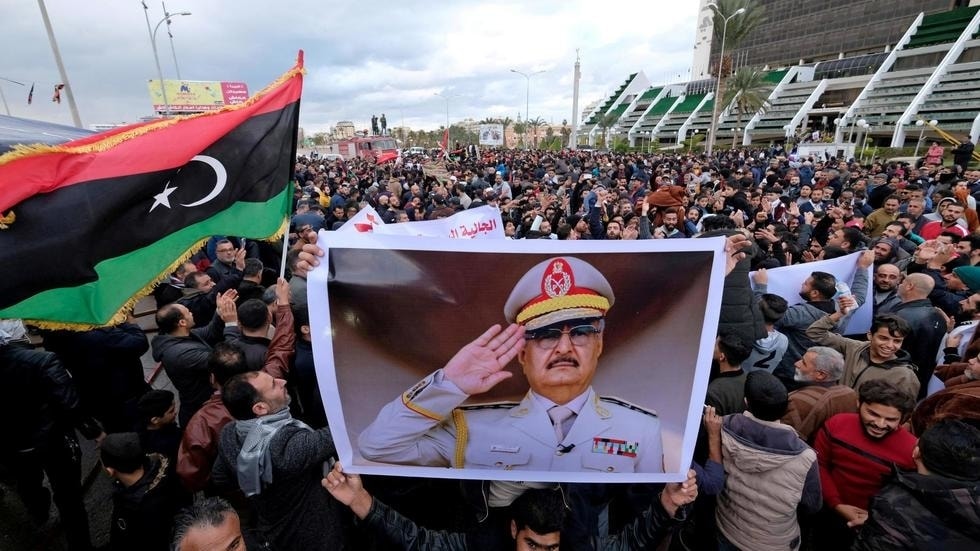 |
| Protesters in Benghazi (Libya) on January 3, 2020 protest against the decision of the Turkish Parliament to send troops to Libya. REUTERS/Esam Omran Al-Fetori |
After Libya was destroyed by NATO, two opposing forces were formed: the Libyan National Army (LNA) commanded by Marshal Khalifa Haftar and the Government of Libyan Unity (GNA) based in Tripoli. The GNA was recognized by the UN, but is only a transitional government. After two years, elections must be held to form a unified Libyan government.
LNA occupies more than 70% of the land and most of the oil fields, while GNA occupies more than 60% of the population. Supporters of LNA include: France, UAE, Saudi Arabia, Egypt. Supporters of GNA include: Italy, Qatar, Türkiye. The US and Russia have not yet publicly sided with LNA or GNA.
Since April 2019, LNA has launched a campaign to liberate Tripoli but was forced to stop due to Türkiye's intervention. In September 2019, the campaign continued to break out and up to now, with the help of Russian PMC forces (paid by Saudi Arabia), Tripoli is at risk of falling...
Geopolitical shockwaves in the Middle East
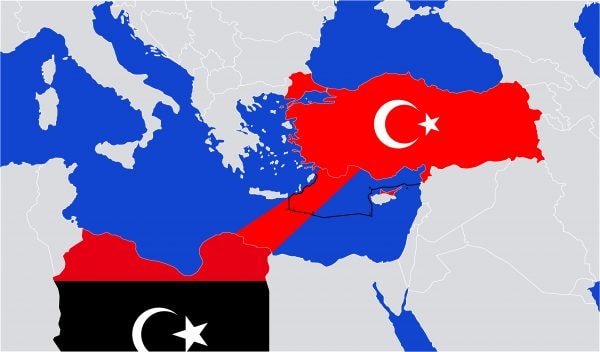 |
| Türkiye's ambition to expand its hegemony in the Mediterranean. Photo: Internet |
On November 27, 2019, Türkiye and the Libyan GNA signed a Memorandum of Understanding (MoU) that commits Turkey to providing military support to the GNA. The MoU also redraws Türkiye’s maritime boundaries in a way that will have a significant impact on gas shipments from the Eastern Mediterranean to Europe.
Türkiye’s bold move to protect the GNA and extend its maritime border from Europe to Africa, essentially creating a “water corridor” across the eastern Mediterranean, connecting the Turkish and Libyan coasts, has angered regional rivals and paved the way for a dramatic escalation in Libya’s civil war. It has also forced leaders in Europe and the United States to decide how they will counter Türkiye’s plans.
Türkiye’s opponents have strongly opposed the deal, calling it a major coup in energy geopolitics and an expansion of sovereignty, a “naked” power grab that would undermine Turkey’s ability to transport natural gas from the Eastern Mediterranean to Europe without passing through Turkish waters.
In effect, Türkiye has created a border the width of the entire Eastern Mediterranean.
Clearly, in any case, the Türkiye-Libya deal has set the stage for a broader conflict that will inevitably involve Egypt, Israel, the UAE, Saudi Arabia, Europe, Russia, and the United States.
Israel is particularly worried that the new deal will undermine its plans for the 1,900km EastMed pipeline linking the Leviathan gas field, off the coast of Israel, to the EU and could block Israel's access to the sea.
The unexpected alliance between Türkiye and Libya is arguably a geopolitical earthquake that has changed the balance of power in the Eastern Mediterranean and across the Middle East.
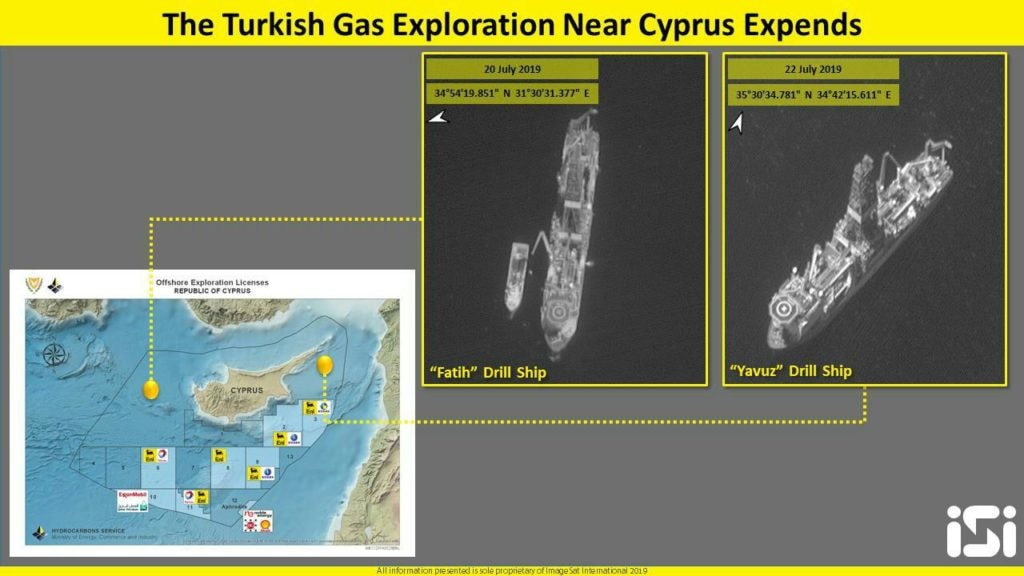 |
| Türkiye defied the odds by sending naval-protected drilling rigs into Cyprus' EEZ. Photo: Internet |
What is Russia's position in Libya?
On January 8, 2020, Putin met with Erdogan in Istanbul, Türkiye. The first thing Putin and Erdogan did was to open the Turk Stream gas pipeline (the US announced sanctions against it along with Nord Stream 2). Next, they discussed Syria, but more importantly, the situation in Libya.
The agreement sets out a joint Russian-Turkish initiative for a ceasefire in Libya starting at 00:00 on January 12, 2020. And, on January 13, 2020, the heads of the LNA and GNA will travel to Moscow to negotiate the agreement under the witness of the two foreign ministers of Russia and Türkiye and observers from the UAE, Egypt, and Saudi Arabia.
It appears that this decision was made without consulting Marshal Haftar, and Haftar responded immediately by within a few hours, LNA official General Ahmed al-Mismari announced that Haftar's army would continue the fight against terrorist groups classified under the UNSC resolution.
Of course, with Haftar, after a series of failures, finally about to achieve military success, taking Tripoli, taking the rest of the country, he was forced to stop. Military logic was unacceptable. But… the ceasefire was still implemented. On January 13, Marshal Haftar and Prime Minister Fayez al-Sarraj arrived in Moscow as scheduled…
What does this development say? If recently, Italy, France and the EU organized a conference on Libyan peace but failed because Marshal Haftar did not attend, then the fact that Russia and Türkiye summoned the two leading figures to sit together in Moscow, even though Haftar later left Moscow without signing the agreement for many reasons... is a success.
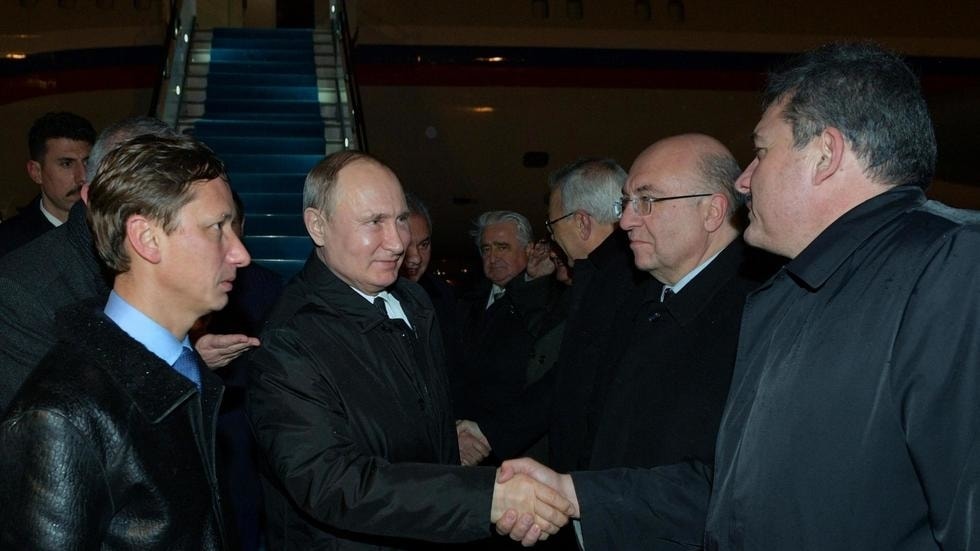 |
| Russian President Vladimir Putin (second from left) arrives in Istanbul, Türkiye, on the evening of January 7, 2020. Sputnik/Alexei Druzhinin/Kremlin via REUTERS |
Why didn't Haftar sign the deal?
Is it true that Russia does not have enough influence on Haftar? It is not logical, because if the influence is not strong enough, why should Haftar stop firing when victory is within reach and Moscow has already arrived. Obviously, France has pointed out that the Russian PMC forces in the LNA offensive, paid by Saudi Arabia but commanded by the FSB, contributed greatly to the LNA's victory... and therefore, Russia's influence is decisive and cannot be doubted...
Is it Russia that asked Haftar not to sign the agreement? This is very likely because of the visit of German Chancellor Merkel earlier on January 11. During the meeting, Putin and Merkel agreed to hold a conference on peace for Libya in Berlin, but if the Russia-Turkey Agreement on Libya is signed, the conference in Berlin will be meaningless.
Meanwhile, Russia wants to protect the newly "fermented" German-Russian relationship, raise Germany's position, and bring Germany and the EU into the game in the spirit of "You destroyed Libya, so you have to rebuild it"...
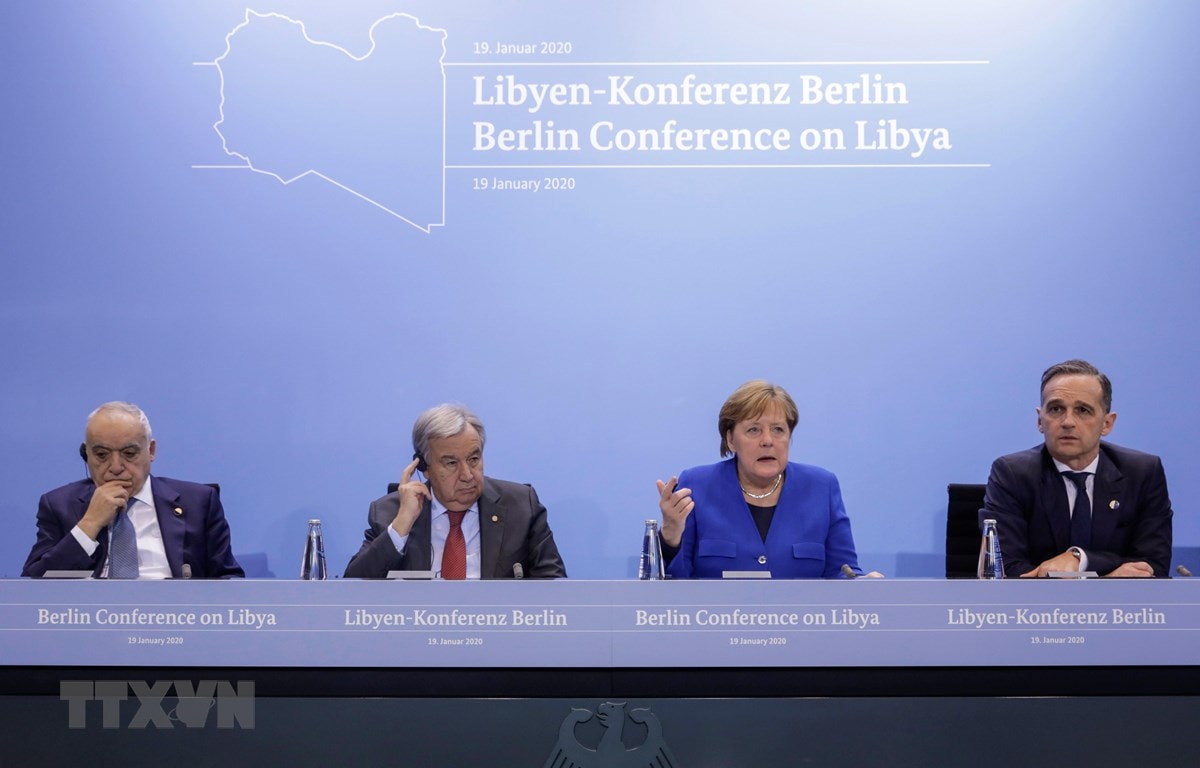 |
| UN Special Envoy to Libya Ghassan Salame, UN Secretary-General António Guterres, German Chancellor Angela Merkel and German Foreign Minister Heiko Maas at a press conference at the end of the international peace conference on Libya in Berlin on January 19, 2020. (Photo: AFP/VNA) |
Obviously with the January 12 ceasefire agreement and the Russia-Türkiye peace initiative, Russia used one arrow to kill two birds.
The first,Russia has saved Türkiye a clear defeat because it is difficult for Türkiye and the GNA to reverse the current military situation. It has spared Türkiye a great bloodshed when confronting the LNA. In fact, Haftar's army is not Kurdish but much stronger. At the same time, Türkiye's Mediterranean Sea cooperation agreement with Libya (MoU) is still maintained. Turkey will use its "sword" (when the agreement with Libya on the EEZ in the Mediterranean is preserved) to cut off the Israel-Greece-Cyprus gas pipeline that is starting to compete with Turk Stream without Russia having to intervene.
Monday,Russia has become the main "player", a mediator in establishing a peaceful solution, building a new government according to the election process in which the LNA has an absolute advantage, ending an anarchic, divided Libya... restoring economic contracts worth tens of billions of dollars to Russia in Libya.
In the end, the Libya Peace Conference in Berlin on January 19th was a complete failure because a group of countries that had once devastated and blatantly violated Libya's sovereignty now called for anti-intervention and protection of Libya's sovereignty, which was truly comical. Therefore, in the end, as Turkish President Erdogan said: "Only Russia can solve the remaining Libyan situation."
The war situation in Syria in Idlib and Libya is like two variables in a geopolitical equation between Russia and Türkiye. It is easy to understand why in Idlib – Syria, Turkish President Erdogan only shouted “smoke” but not “fire”.

